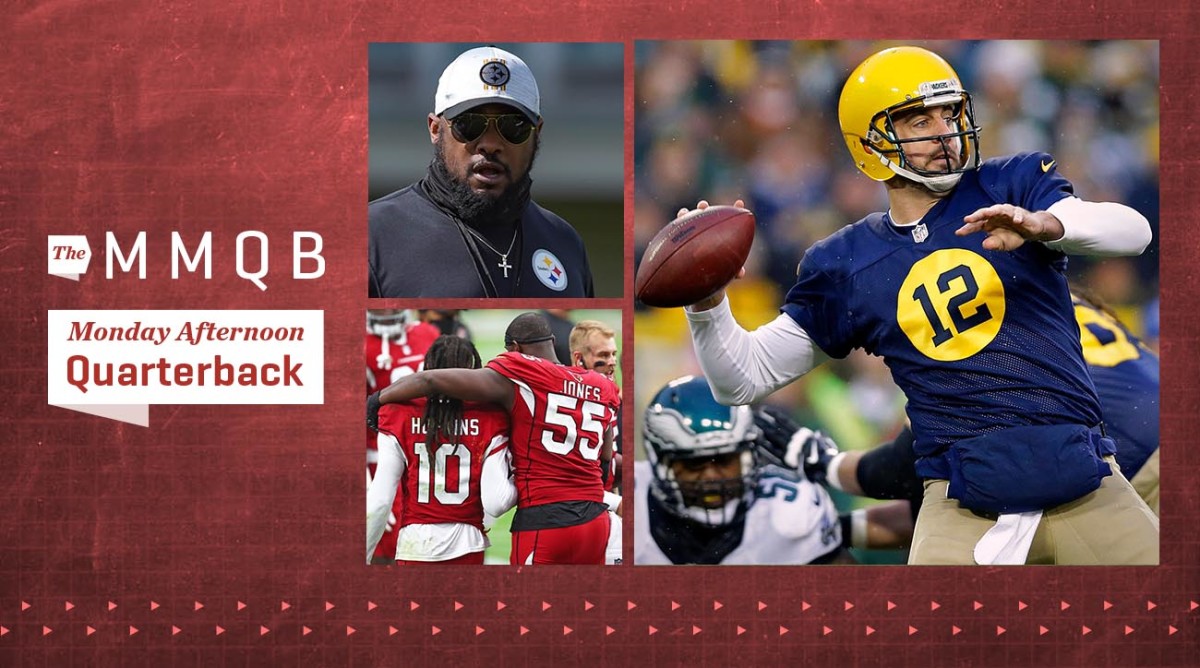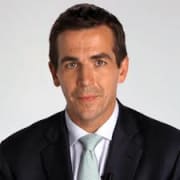MAQB: How the Packers Should Adjust Aaron Rodgers’s Contract
My camp trip is here, and the NFL news cycle is spinning.
I’ve said most of what I’m going to say on Aaron Rodgers, with Packers veterans set to report to Lambeau in less than 24 hours. But one thing I’d add here that I think is important: If Green Bay were to lop years off Rodgers’s contract—as has been suggested—promise not to tag him, and give him the kind of freeway to free agency Tom Brady got in the summer of 2019, the team would be doing a lot more for Rodgers than the Patriots did for Brady back then.

Brady was going into the final year of his deal. Rodgers isn’t; he has three years left. And Brady landing the no-tag provision was part of the Kraft family’s standing promise that Brady had earned the right to finish his career as he liked. Conversely, the Packers, in doing this, would be erasing two years from a deal Rodgers signed that had a $57.5 million signing bonus, agreeing to take on over $17 million in dead money in 2022, and losing their ability to leverage, potentially, three or four first-round picks out of someone else in a trade for Rodgers.
The ceiling for the return then, because Rodgers is over 30 and has accrued more than 10 years in the league, would be set at a fifth-round comp pick. This is just me, but I wouldn’t agree to do that if I were the Packers.
What would make more sense would be lopping 2023 off the deal and giving Rodgers a no-tag provision. That puts the Packers in a spot where they’d have to deal him after this year if they want any sort of return—but still protect his trade value—and also the chance to give him a massive new contract if things improve. Throwing a no-trade clause in there would allow Rodgers to dictate his destination.
It’s mind-bending to think about this—but you can look it up, it’s true: Mike Tomlin this year will match Bill Cowher for longevity in Pittsburgh. This season, the one in which Cowher will go into the Hall of Fame, will be Tomlin’s 15th leading the Steelers. And sure enough, when I presented that fact to Tomlin on Saturday afternoon, and asked him if he’d thought about that, he answered in the sort of way that only he could.
“I don’t. There are so many challenges day-to-day,” he says. “The here and now. The urgency that’s required to prepare this group and walk this journey. There’s just not a lot of time to ponder my journey, and in particular my journey as it pertains to other people’s. I get what people mean when they ask me that. It’s just not something that you spend a lot of time thinking about. To be honest with you, I’m so busy living it, and enjoying those challenges, trying to be my best, trying to get better.
“Maybe at some point in life I can absorb it that way, but it’s just not in my mentality now.”
I then countered by saying that he must’ve had a lot of respect for Cowher’s ability to last that long after himself having replaced Chuck Noll. Tomlin gave me a smile, and laughed.
“That’s B.C.! He’s a gold jacket guy,” Tomlin says. “I’m sure when Bill was doing it, he didn’t give a damn either.”
So no, Tomlin isn’t looking for a brass ring for hitting a decade-and-a-half for an organization that’s bar is always set high. That said, he did acknowledge the challenge in always having messages that resonate over the years. There’s been an old adage in coaching that after a decade, one guy’s voice can lose its hold over a locker room—something that I can remember being raised in cases where Bill Walsh and Pat Riley walked away from jobs a couple decades ago.
Tomlin is one of five coaches (Bill Belichick, Sean Payton, John Harbaugh and Pete Carroll are the others) having crossed over that mark with their current teams. And he doesn’t deny that there are ways he’s directly combatted the threat of ever getting stale.
“I think it’s just staying connected to (the players), understanding where they come from,” he said. “The nature of the guys’ journey today that I coached is very different than the journey of the guy that I coached 15 years ago. Some of the social-media things, that stuff didn’t exist when I was coaching James Farrior and that group. So I try to stay connected to them, what’s going on in their lives.
“I think being a parent and having kids that are somewhat in the age group of those guys keeps me connected. I think that more than anything allows you to be light on your feet, the understanding that things change, particularly in college football.”
And as such, in working with college football leaders in particular, Tomlin has been aggressive, especially with those in programs like Alabama, Clemson and Ohio State—places he and GM Kevin Colbert visit annually and programs with which the Steelers have cultivated relationships.
“I got a bunch of relationships, man,” Tomlin says. “Those teams are consistently in the mix for a reason, and they got guys coming into the draft every year, so they become routine stops, and in the midst of those routine stops, you got time to do some side projects and gain some understanding. … I stay connected to college football coaches. I learn a lot from them. When I’m evaluating in the spring, and going out and preparing for the draft, I’m also studying programs and coaches and seeing what’s important to them, and the lives of the people they work with, because invariably those are gonna be some of the people that I work with.
“That’s a process that I start anew every year. Got good relationships with guys that coach in college, so, Hey, take me to your social media coordinator, let me spend five minutes with them and see the points of emphasis they’re making to the 18-year-olds that are coming into your program.”
On top of that, Tomlin has three kids who are athletes, two sons playing college football and a gymnast daughter, and he’s not afraid, through normal fatherly conversation, to pick their brains to know what he needs to know. And that bank of knowledge he’s built on how his players live their lives is noticeable to the guys in the locker room.
“I think it helps that he’s got two boys that are in college,” says Ben Roethlisberger, the one player who’s been with Tomlin from the start. “He knows what’s cool in the new era, the new generations. He’s always got new sayings, new things, new philosophies. As he would say, He keeps it fresh.”
And it’s kept him moving for as long as Cowher was in Pittsburgh, which is a pretty remarkable feat.
• While we’re with the Steelers, one thing I couldn’t fit into this morning’s column: I did ask Roethlsberger if he knows how much longer he wants to play. “I don’t,” he answered. “I always take it one year at a time. What’s most important, I want to give everything I have to this season, because this is the most important season I have.” This, for what it’s worth, is the final year of his contract.
• Regardless of how the Rodgers situation plays out, if the outcome is, has been widely speculated for a while, a one-year Band-Aid, then both Rodgers and Seattle’s Russell Wilson go into this season with the prospect that next offseason could play out the same way this past winter did. Which, of course, puts a fair amount of pressure on those teams to get it done in 2021.
• A notable promotion that happened, officially, on Monday: The Colts promoted pro scouting director Kevin Rogers to director of player personnel. Rogers is widely considered one of the top evaluators in GM Chris Ballard’s deep stable of scouts, and allowing for him to cross over to the college side gives him a shot to take some steps towards eventually getting in the mix for general manager jobs.
• Washington signing Jonathan Allen to a four-year, $72 million extension is an important piece of business, and likely just the start of reinvesting into a defensive line that should define the team’s identity for the foreseeable future. Allen’s college/pro teammate Da’Ron Payne is next up—eligible for a deal now, and having had his fifth-year option for 2022 picked up. Montez Sweat will be eligible for a second contract next spring with the guy who promises to be the most expensive, Chase Young, eligible the year after that. Put it all together, and Ron Rivera and Co. may need to make a tough decision or two here. But that’s an awfully good problem to have.
• On Sunday, ESPN’s Jeremy Fowler reported that Chandler Jones requested a trade from Arizona, and it’s obvious why the 31-year-old edge rusher would do that. He’s going into a contract year and wants to get paid. Jones has a different personality, so it’s hard to guess at the impact all that will have on his season. But it’s not difficult to see how DeAndre Hopkins and J.J. Watt scoring big paydays—both getting the kind of third NFL contract Jones wants before playing a down for Arizona—might play into his mindset here.
• On Monday, we learned the Rams, dealing with the loss of Cam Akers, will sit new/old lead back Darrell Henderson throughout the preseason, and the Bengals will do the same with Joe Burrow, who’s coming off a torn ACL. I’d expect other teams will use joint practices to get star players reps, rather than risking them in preseason games. All of which will lead the league back to where it’s been with these “games”—they’re still going to be a bad product. The league has done what it can to try to influence teams to use stars in them (even adding a “bye” weekend at the end of preseason to create more separation from the regular season), but I think it’s fair to say that the exhibition slate is going remain what the exhibition slate has always been.
• Count the yellow and red wristbands utilized by teams to denote unvaccinated and vaccinated players as another move to chip away at the shrinking group of guys that haven’t yet gotten the shot. We’re down under 17% of players unvaccinated now.
• Best to Colts coach Frank Reich. He’s asymptomatic and fully vaccinated. And it’s fair to think the latter might have something to do with the former; both will help him get back on the job quickly.
More NFL Coverage:
• MMQB: Deshaun Watson's Awkward Training Camp Arrival
• Mailbag: Will Big Ben Bounce Back?
• Kyler Murray’s Pivotal Year
• Robert Saleh Looks Forward to Jets’ Adversity
